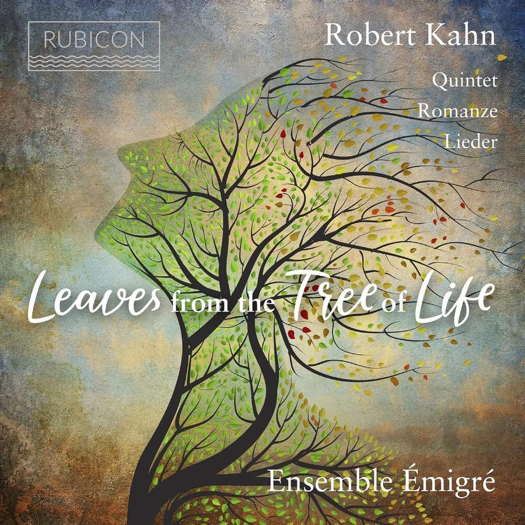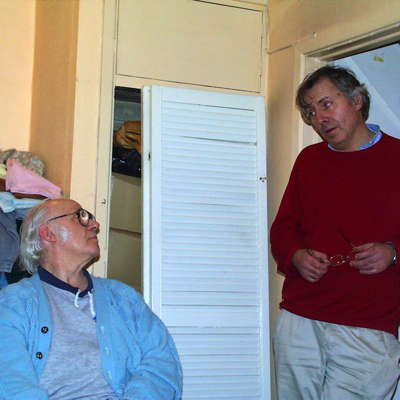- Zoltán Kodály
- Cadogan Hall
- Emil Reesen
- Martino Tirimo
- Christopher Gunning
- Reynaldo Hahn
- Boris Lyatoshynsky
- Simple Gifts

High Romanticism
PAUL SARCICH discovers the music of Robert Kahn
'Ensemble Émigré have done fine service to Kahn ...'
Ensemble Émigré is a group that has arisen at the Royal College of Music out of projects dealing with German and Austrian composers who fled the Nazis in the 1930s and fetched up in Britain. Propelled by scholar-musicians Norbert Meyn (Principal Investigator of the Music, Migration and Mobility project at the RCM and a vocal tutor there) and Ingrid Pearson (clarinettist and Senior Academic Tutor), their first CD features the music of Robert Kahn (1865 Mannheim-1951 Kent), a name hitherto unfamiliar to me and I suspect many others, but now undergoing something of a revival, among a number of composers of Nazi-labelled 'degenerate music' now being re-examined.
Kahn was no slouch in his day - born into an influential Jewish family, he counted Brahms, Joachim, Busch, Mühlfeld and von Bülow as colleagues, taught at both the Könglische Hochschule für Musik and Akademie der Kunst in Berlin, (numbering the likes of Rubenstein, Kempff, Leitner and Skalkottas among his students) before being expelled from the latter in 1934. He withdrew to a country house until being forced to flee in 1939, having been widely performed and published until this time. Unlike so many composers forced out, most of his music survives, in both published form and manuscript, thus there is no problem with material. This disc has representations from Kahn's main compositional activities: song, piano music, chamber music - only choral works are missing.
The disc opens with the Romance in F minor for cello and piano, in which Gemma Rosefield's rich, warm cello tone matches the style of the music admirably: 'Brahmsian' yes, but Kahn swiftly shows he is his own man, taking his place in the succession of German Romantic composers without difficulty. For this is indeed High Romanticism, with the full piano writing well handled by Danny Driver to enhance and not overwhelm the cello part.
Listen — Robert Kahn: Romanze in F minor, Op 25 No 1
(track 1, 0:02-0:49) ℗ 2021 Ensemble Émigré :
Eight of Kahn's over two hundred Lieder are presented here, and a very well chosen selection: seven different poets and a number of different subjects and moods show Kahn to be a sensitive song-setter, going for simplicity, naturalness and direct expression, rather than say, the operaticness of his contemporary, Strauss. Some may be reminded of Schubert in the repetitive accompanimental figures of 's ist ein so stiller heil'ger Tag or the storminess of Novemberfeier; or perhaps Schumann in the seriousness of Feuerbestattung, but Kahn has his humorous side, managing to give a both funny and slightly creepy portrait of an evil toad in Die Unke.
Listen — Robert Kahn: Die Unke
(track 17, 0:00-0:34) ℗ 2021 Ensemble Émigré :
Simple religiosity is exhibited in Idyll (founded in a carol tune) and Gebet (Prayer), and none of these songs would trouble anyone familiar with the bulk of nineteenth century Lieder, which is where, stylistically, they firmly belong. Given that there are at least two hundred more, singers have a treasure trove to explore in Kahn's work.
All are sung by tenor Norbert Meyn, whose voice lies on the sweet rather than robust side, and there were times in some tracks when the accompaniment grew very active and thick, that pianist Christopher Gould needed to rein in the romantic instincts a bit - tall order for a pianist given this sort of writing admittedly, but some restraint would have helped the balance here and there.
One of the most remarkable things to come out of Kahn's story is his Tagebuch im Tönen, or Diary in Tones, which he started in 1935 and added several pieces a week to for the next fourteen years, eventually reaching a total of around 1,160 pieces. Pianist Danny Driver presents ten of these little 'musical poems' - although some are not so little, like the six-and-a-half minute set of variations offered first. Most of these pieces were written after he came to the UK, already a man of seventy-three, but the style remains that of the nineteenth century Romantic, although some of the earlier 'character' pieces do stretch the traditional a little (in a direction that might remind listeners of an approachable Reger or Busoni). All wear their Germanness on their sleeves; influences like Bach are obvious.
Listen — Robert Kahn: Allegretto con moto (Tagebuch in Tönen No 53 in E)
(track 10, 0:00-0:24) ℗ 2021 Ensemble Émigré :
The lightness of the 'Jeanne Suite' pieces comes as a happy contrast, but throughout Kahn seems not to be going for virtuosity for it's own sake; each piece has an integrity and carries its ideas through clearly. They receive sparklingly simpatico performances from Driver.
Finally, the world premiere recording of the Quintet Op 54 from 1911, for the unusual combination of piano, violin, cello, clarinet and horn. The latter three instruments in particular allow for some blending of sound which at times gives an almost small orchestral sonority. An impassioned and restless first movement shows the hallmarks of someone who has learned his craft thoroughly, in the academically approved fashion, although in common with a lot of Romantic German chamber music there is a tendency to overwrite for the piano at the expense of other instruments. The often dense, competing lines certainly put one in mind of a Brahms-Reger axis; there is indeed inventiveness, if not always interest.
The second movement is an unusual presto, the piano driving along a moto perpetuo style, broken up by more reflective interludes on the other instruments, at times approaching a folkish sound; or, in opposition to that, more serious and sinuous lines. Musically it is more interesting and individual than the first movement.
Listen — Robert Kahn: Presto assai (Quintet in C minor, Op 54)
(track 21, 2:30-3:24) ℗ 2021 Ensemble Émigré :
The third andante movement returns to the world of the first, competing lines in thick textures set off by little solo moments for all the instruments, but all hindered by not very distinguished melodic material, which repeats often enough, but never builds into a big melodic statement à la Brahms. All very pleasant on the ear, but memorable ...? It does not match the cello Romance in melodic quality, despite the attractive orchestrational results.
The final allegro agitato movement, like the second, is much more ear-grabbing and quirky, with frequently changing textures and more inventiveness in the figures and their treatment. Coming across as something like a German Saint-Saëns, it is the most engaging movement of the four. The piece as a whole receives joyful and committed playing from the ensemble.
How to sum up Kahn then? I could not go so far as the booklet notes in claiming him to be a 'vital link' between the late nineteenth and early twentieth centuries of German music, as there is little evidence in his work of any of the musical upheavals that happened in that period, Kahn remaining thoroughly embedded in the Romantic tradition, even while writing beyond World War II. In this he might be compared to Strauss, but Kahn would have never written something like Elektra. Even though turning down the chance to become Brahms' pupil, his work is certainly Brahms-influenced while not totally living in his shadow. But nor does he have Brahms' stature. He stuck to small forms - song, chamber music, choral - no large scale orchestral works, let alone opera.
Some while ago I wrote a review of the music of René de Boisdeffre, an earlier French Romantic composer, and was reminded of this by Kahn - both composers sitting a little way down the High Table of Romanticism but producing works that deserve to be heard and considered, and which will give much satisfaction to those who favour their periods and styles. Ensemble Émigré have done fine service to Kahn, and intend to produce more recordings of transplanted composers, Egon Wellesz among them, so do keep an eye and ear out - this could get very interesting.
Copyright © 8 April 2021
Paul Sarcich,
London UK

CD INFORMATION: LEAVES FROM THE TREE OF LIFE




